
Marie Antoinette was the last queen of France prior to the French Revolution. She was born an archduchess of Austria, and was the penultimate child and youngest daughter of Empress Maria Theresa and Emperor Francis I. She became dauphine of France in May 1770 at age 14 upon her marriage to Louis-Auguste, heir apparent to the French throne. On 10 May 1774, her husband ascended the throne as Louis XVI and she became queen.

Jeanne Bécu, Comtesse du Barry was the last maîtresse-en-titre of King Louis XV of France. She was executed by guillotine during the French Revolution on accusations of treason—particularly being suspected of assisting émigrés to flee from the Revolution. She is also known as “Mademoiselle Vaubernier”.

The Affair of the Diamond Necklace was an incident from 1784 to 1785 at the court of King Louis XVI of France that involved his wife, Queen Marie Antoinette.
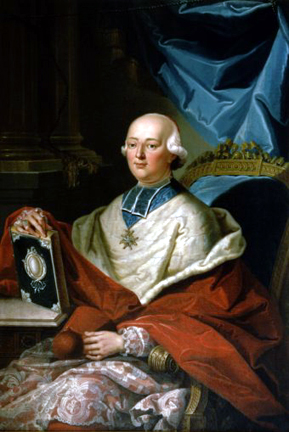
Louis-René-Édouard de Rohan known as Cardinal de Rohan, prince de Rohan-Guéméné, was a French Bishop of Strasbourg, politician, cardinal of the Roman Catholic Church, and cadet of the Rohan family. His parents were Hercule Mériadec, Prince of Guéméné and Louise Gabrielle Julie de Rohan. He was born in Paris.
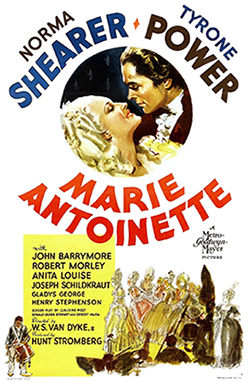
Marie Antoinette is a 1938 American historical drama film produced by Metro-Goldwyn-Mayer. It was directed by W. S. Van Dyke and starred Norma Shearer as Marie Antoinette. Based upon the 1932 biography of the ill-fated Queen of France by the Austrian writer Stefan Zweig, it had its Los Angeles premiere at the legendary Carthay Circle Theatre, where the landscaping was specially decorated for the event.

The Queen's Necklace is a novel by Alexandre Dumas that was published in 1849 and 1850. It is loosely based on the Affair of the Diamond Necklace, an episode involving fraud and royal scandal that made headlines at the court of Louis XVI in the 1780s.

Jeanne de Valois-Saint-Rémy, self proclaimed "Comtesse de la Motte" was a notorious French adventuress and thief; she was married to Nicholas de la Motte whose family's claim to nobility was dubious. She herself was an impoverished descendant of the Valois royal family through an illegitimate son of King Henry II. She has been known for her prominent role in the Affair of the Diamond Necklace, one of many scandals that led to the French Revolution and helped to destroy the monarchy of France.

Nicholas de la Motte, born Marc Antoine-Nicolas de la Motte, was a French adventurer known for his part as a swindler in the affair of the diamond necklace. He was the husband of Jeanne de Valois-Saint-Remy, whom he married on 6 June 1780.

Louis Charles Auguste Le Tonnelier, Baron de Breteuil, Baron de Preuilly was a French aristocrat, diplomat and statesman. He was the last chief minister of the Bourbon Monarchy, appointed by King Louis XVI only one hundred hours before the storming of the Bastille.

Royal Affairs in Versailles is a 1954 French-Italian historical drama directed by Sacha Guitry. Described as "a historical film showing Versailles from its beginnings to the present day", it tells some episodes through portrayal of the personalities who lived in the Palace of Versailles. Its sister films are Napoléon (1955) and If Paris Were Told to Us (1956).
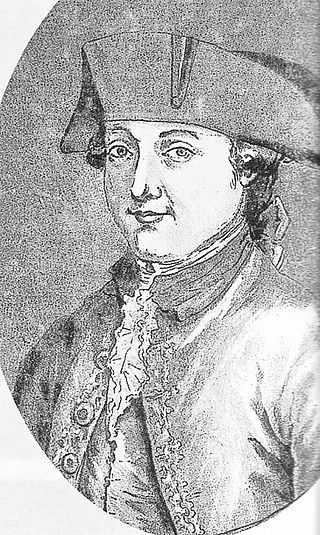
Armand Gabriel Rétaux de Villette was a French procurer, forger, blackmailer and pimp. He participated in the famous "Affair of the Diamond Necklace".
Marie Louise de Rohan, also known as Madame de Marsan, was the governess of Louis XVI of France and his siblings. She was an influential figure of the French court and a driving force of the Dévots and the conservative fraction of the court nobility.
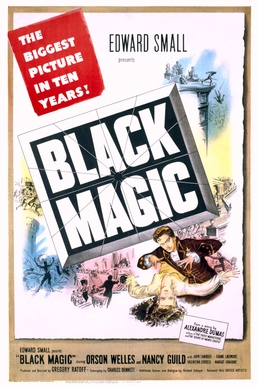
Black Magic is a 1949 American adventure drama romance film adaptation of Alexandre Dumas's novel Joseph Balsamo. It was directed by Gregory Ratoff. Set in the 18th century, the film stars Orson Welles in the lead role as Joseph Balsamo, a hypnotist, magician, and charlatan who also goes by the alias of Count Cagliostro, and Nancy Guild as Lorenza/Marie Antoinette. Akim Tamiroff has a featured role as Gitano. The film received mixed reviews.

Queen Marie Antoinette of France is best remembered for her legendary extravagance and her death: she was executed by guillotine during the Reign of Terror at the height of the French Revolution in 1793 for the crime of treason. Her life has been the subject of many historically accurate biographies and the subject of romance novels and films.

Victoire Armande Josèphe de Rohan, Princess of Guéméné was a French noblewoman and court official. She was the governess of the children of Louis XVI of France. She is known better as Madame de Guéméné, and was Lady of Clisson in her own right.
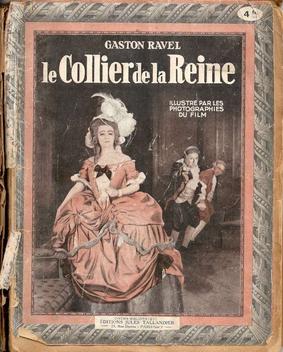
The Queen's Necklace is a 1929 synchronzied sound French historical drama film directed by Tony Lekain and Gaston Ravel and starring Marcelle Chantal, Georges Lannes and Diana Karenne. While the film has no audible dialog, it was released with a synchronized musical score with sound effects. The film is an adaptation of Alexandre Dumas's novel The Queen's Necklace which portrays the Affair of the Diamond Necklace which occurred before the French Revolution. The film's art direction was by Lucien Carré. The film was made and distributed by Gaumont. In Germany it was released by the major studio UFA.

The Queen's Necklace is a 1946 French historical drama film directed by Marcel L'Herbier and starring Viviane Romance, Maurice Escande and Jacques Dacqmine. The film portrays the Affair of the Diamond Necklace which damaged the reputation of the French queen Marie Antionette during the 1780s.
Julie Louise Bibault de Misery née de Chemault (1732-1804) was a French court official. She was the Première femme de Chambre to the queen of France between 1765 and 1786.

Marie Nicole Le Guay d'Oliva, was a French prostitute and memoirist. She is known in history as one of the participants of the famous fraud known as the Affair of the Diamond Necklace.

















